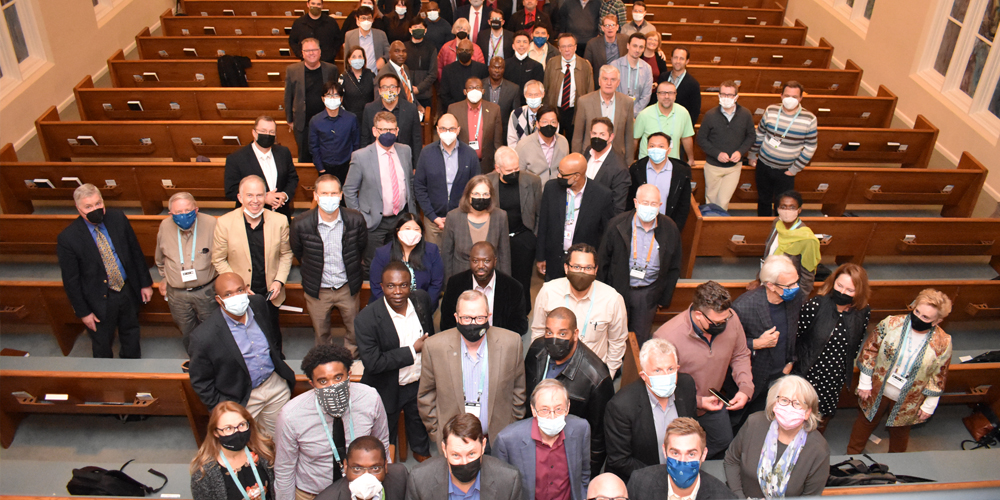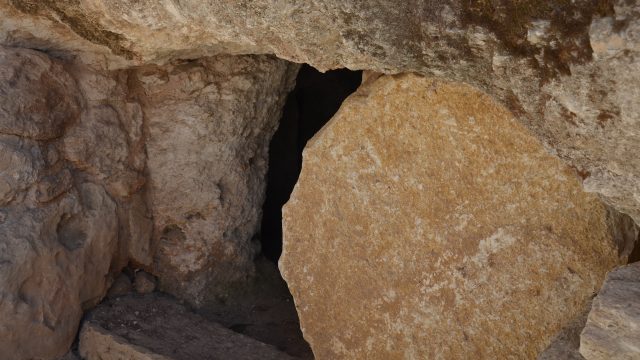Professors, researchers, and graduate students gather annually to sing, pray, and reflect.

Once a year, a Friday evening worship happens at a Seventh-day Adventist church somewhere in the United States that differs from all the rest.
The worship service draws dozens of distinguished Adventist theologians and scholars for moments of praise, prayer, and reflection. The scholars, most of them professors at Adventist seminaries and universities around the world, are members of the Adventist Society for Religious Studies (ASRS) and the Adventist Theological Society (ATS).
The 2021 Friday joint worship service took place at Laurel Heights Seventh-day Adventist Church in San Antonio, Texas, on November 19.
Gathering of Scholars
Every year, ATS members gather on the sidelines of the larger Evangelical Theological Society (ETS) annual conference, which in 2021 met in Fort Worth, Texas, November 16-18. With a historical and, to a certain extent, theological affinity to ETS, the ATS event usually uses the same theme ETS has chosen and provides a biblical Adventist approach to it. In 2021, the program theme was “Wealth and Poverty.”
ASRS, on the other hand, which usually meets in the same or a nearby city as the ATS event, discusses a separate theme its own board has chosen for that particular year. Meetings are typically held around the annual meeting of the Society of Biblical Literature (SBL). In 2021, ASRS met in San Antonio, Texas, November 18-20 under the theme “World Disrupted, World Revealed: Ecology and Theology in an Age of Pandemic.”
ASRS was formally organized in New York City in 1979. Its stated purpose is “to provide intellectual and social fellowship among its members and encourage scholarly pursuits in all religious studies disciplines, particularly with reference to the Seventh-day Adventist tradition.” ATS was organized in 1988 at Southern Adventist University in Tennessee. According to its website, the society’s “conviction and strong desire is to foster biblical, theological, and historical studies that strengthen the Seventh-day Adventist Church’s message and mission.”
Historically, some observers have described ASRS as “more on the progressive side” and more focused on the intersections between Adventism and culture. ATS seems to favor exegesis and connections to the biblical text, and has described itself as an organization providing “balanced and conservative Adventist theology.” Some scholars, however, think these definitions are too broad, since the distinctions may not be as clear-cut as they seem. There is clear overlap between the two societies; a number of Adventist scholars belong to both, and most have colleagues and friends in both.
Joint Worship
Beyond any real or perceived differences, however, as the Friday evening shadows descend on the annual worship to mark the beginning of the biblical day of rest, every church member — scholar, seminary student, professor, or lay supporter — as son or daughter of God ready to give Him praise. In San Antonio, members of both societies, some local church members, and regional church leaders met to sing, pray, and reflect. Potential differences seem to be blurred as long-time researchers and doctoral students, male and female, lead singing, read Scripture, and prayed together in small groups.
Sponsored by the Ministerial Association of the North American Division (NAD), the 2021 gathering featured devotional moments and a message by Southwest Region Conference president Carlton Byrd.
The “Scholars’ Vespers,” as the annual service is informally known, included reading selected passages of Scriptures in many languages. Among the Bible passages were excerpts from Psalm 59 in German, Psalm 77:2 in Papua New Guinea Pidgin, and Psalm 89:46 in Mandarin. Additional languages included Chichewa, Korean, Swahili, and Norwegian. Most readers were native speakers of the language used, while several were reading in the second or third language they learned while serving as international missionaries.
Meaningful Ceremony
Before partaking in individually sealed cups of grape juice and praying in pairs or small groups, participants were invited to write their grievances and challenges on a small piece of a special paper. “Only the Lord and you will know what is written on the piece of paper,” NAD Ministerial Association associate director Dave Gemmell assured them. Participants were then invited to place their pieces of paper in jars in a warm chemical solution that dissolved them almost instantly. “God has now taken all that which was bothering you,” Gemmell said. “The pieces of paper are gone.”
In his message, Byrd reminded those attending the service that even seasoned scholars “who know more than me” about God’s Word “need to remember that Jesus loves us.”
Based on the sobering story of Cain and Abel in Genesis 4, Byrd reminded Adventist scholars that in this world, “family feuds are real and happen in real life.” Feuds can adopt many forms, Byrd noted. “Liberal versus conservative, academic versus practical theologians, and so forth and so on,” he said. “Sometimes, those closest to us may be the ones with more potential to hurt us.”
In the case of Cain and Abel, the day started with the sacrifice of an animal and ended up with the sacrifice of a man, Byrd said. In a sense, he added, it announced that “the bleeding lamb would be replaced by a bleeding man.”
Jesus would be the bleeding man who would come to save us, Byrd emphasized. “The blood of Jesus is stronger than anything else,” he said. “We may have family feuds in the church, in our homes, in our jobs, but I want everyone to know that the blood of Jesus will never lose its power. His blood is going to save us.”








